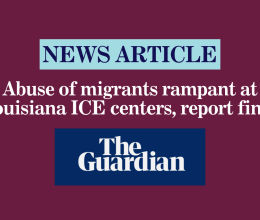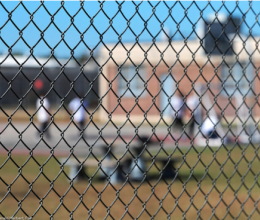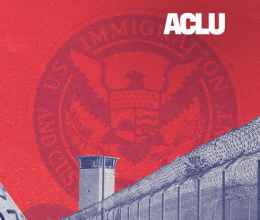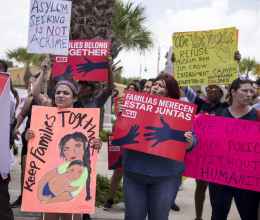NEW ORLEANS — On the heels of the ACLU’s new research study about barriers to legal representation in U.S. Immigration and Customs Enforcement (ICE) detention centers, the ACLU of Louisiana and its coalition partners – National Immigration Project of the National Lawyers Guild (NIPNLG), Rapid Defense Network (RDN), Robert F. Kennedy Human Rights (RFK), and the Southern Poverty Law Center (SPLC) – launched a legal rights initiative designed to provide people detained in Louisiana with knowledge about their right to seek relief before federal courts through the writ of habeas corpus. In conjunction with Covington & Burling LLP, the group developed and distributed “Pro Se” materials in eight languages to detention centers.
“The ACLU of Louisiana and our partners are concerned that people who are detained by immigration authorities are not aware of their basic legal rights as it pertains to seeking relief before the federal courts through the writ of habeas corpus. The immigration detention centers in Louisiana are vast in number and geographically-diverse and the current Legal Orientation Program (LOP) does not provide any information regarding the rights of people to seek relief in federal court through the writ of habeas corpus,” said Nora Ahmed, ACLU of Louisiana Legal Director.
“ICE is essentially warehousing people in largely rural private jails throughout Louisiana without adequate access to legal or other advocacy or community support. These jails are an integral piece of the deportation machine, and in traveling to them to present basic legal information, we are able to inject some small amount of transparency, accountability, oversight, and humanity into a destructive system,” said Matthew Vogel, Supervising Attorney at NIPNLG.
“Immigration detention is a cornerstone of mass incarceration in the United States and Louisiana holds more immigrants in detention than any other state except for Texas. Each year, the federal government quietly ships thousands of immigrants fighting deportation to a network of private prisons in rural Louisiana, cutting them off from access to lawyers, family, and support networks. By providing education on basic legal rights, we take a much-needed step to ensuring that everyone has a full and fair hearing of their immigration case,” said Anthony Enriquez, VP of U.S. Advocacy and Litigation at Robert. F. Kennedy Human Rights.
“ICE imprisons thousands of immigrants in Louisiana and many of them do not have access to legal representation. Although we have worked hard to prepare resources for them, it is impossible to adequately present information in as many languages and forms needed for people facing life or death stakes in their immigration cases. We hope this project will increase access to federal courts and facilitate justified releases from ICE detention,” said Rose Murray, Direct Services Attorney at the Southeast Immigrant Freedom Initiative of the Southern Poverty Law Center.
“Individuals in immigration detention face tremendous hurdles in accessing legal resources and representation, which can result in individuals being detained for years while awaiting a hearing or removal. Together with the ACLU of Louisiana and coalition partners, Covington hopes to expand the resources available to detained individuals for challenging their detention through the writ of habeas corpus. We are grateful to the ACLU of Louisiana and the Rapid Defense Network for their guidance, and we hope that the materials we put together will provide relief for those unconstitutionally detained,” said Hannah Hummel, Associate at Covington & Burling LLP.
The ACLU’s report No Fighting Chance: ICE’s Denial of Access to Counsel in U.S. Immigration Detention Centers examined conditions at 173 detention facilities around the country, and found that ICE detention facilities have systematically restricted basic modes of communication between attorneys and detained immigrants.
Key findings, garnered through phone calls to detention facilities and from surveys with immigration attorneys nationwide, presented in the report include:
- At 20 percent of the detention facilities called by researchers, no one ever picked up the phone or operators refused to answer basic questions about attorney access.
- At least 58 ICE detention facilities do not allow attorneys to schedule phone calls with a detained client at a certain date and time.
- Detained immigrants must pay to make outgoing phone calls to lawyers at approximately 85 percent of facilities from which we received responses.
- Attorneys at nearly half of the 44 facilities from which we received attorney survey responses reported arbitrary delays or denial of access to their clients at the facility.
- Attorney respondents at several facilities reported that in-person visits do not take place in confidential settings, destroying attorney-client privilege.
The ACLU and our partners also recommend Congress pass legislation to reduce funding for ICE detention, and ensure that DHS removes barriers to legal access.
###








